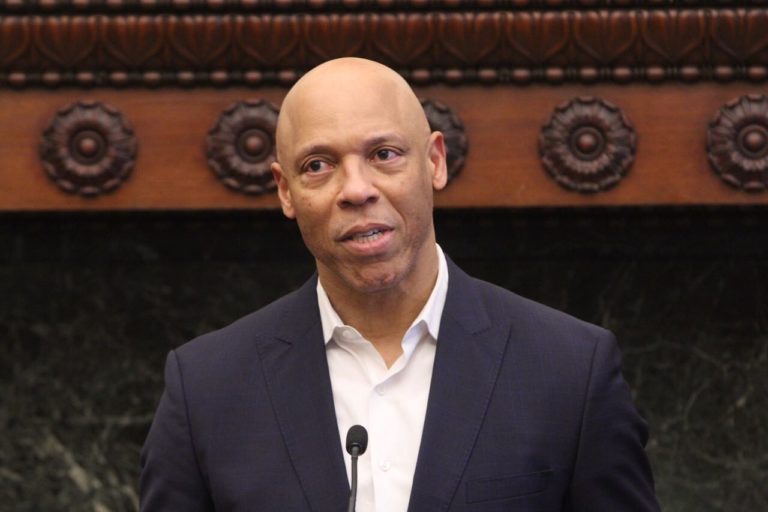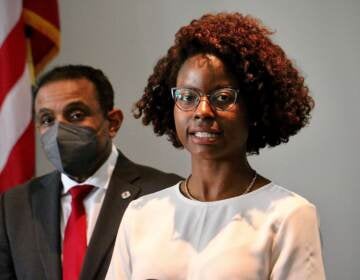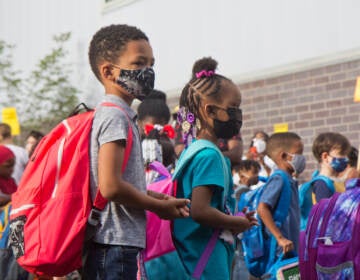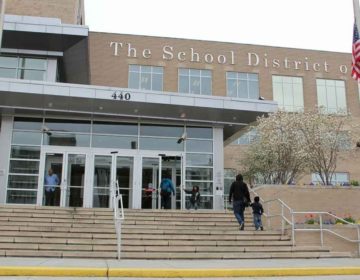Hite explains how online learning will work for Philly schools starting next week
The District is trying to plan a citywide virtual graduation, and maybe even a prom, the superintendent said.

School District of Philadelphia Superintendent William Hite. (Emma Lee/WHYY)
This article originally appeared on The Notebook.
—
Superintendent William Hite said Thursday that the experiences of students and parents in connecting with their schools “should see and feel very different” starting Monday as online learning formally starts in the Philadelphia School District.
In his weekly call with reporters, Hite said that up until now, teachers had been encouraged to contact students and offer assistance with the learning packets that students were provided, but as of next week, “everyone is required to reach out to children,” he said.
From April 20 through May 1, what Hite called “digitized learning” will begin. He said it would be “teacher-led,” but still “enrichment and review.” Essentially, a new set of learning packets that had been available for two-week spans over the last month will be online. And teachers and other school staff will be required to start implementing the guidance they received March 30 regarding daily office hours and reaching out to a designated group of students at least once or twice a week. Some teachers and schools have already been doing this, while others have not.
On May 4, “planned instruction” will begin, with the introduction of new material. The District will begin tracking participation by both students and teachers. Teachers will begin giving out grades.
However, he said, details of grading are still being worked out.
“We are still determining what to grade and how,” he said. “I suspect some will be more about participation than actual content,” and failure to participate will have consequences. He noted that some high school seniors will be required to complete some classwork in order to graduate.
But there are still many unknowns. Some states, he added, are actually prohibiting grading due to concerns over not penalizing students who do not have access to the technology required to do schoolwork online.
On that front, the District is “hyperfocused on getting the technology out.” Over the next two weeks, it will complete distributing its Chromebooks and working to make sure that all students have online access. Hite said that while some schools have successfully given laptops to all students who need them, a few schools have been unable to track down up to 15% of their students. He cited one school with an enrollment of 380 that was unable to reach 70 students. That’s part of the “challenges of where the schools are located and the circumstances surrounding some housing situations,” he said.
At the end of Friday, after all schools have conducted their Chromebook distributions, Hite said he would have a better idea of what percentage of students had failed to pick up their laptops. Another yet-to-be-scheduled opportunity will be provided to those families at a centralized location next week, he said.
He also said that the District is continuing to work to provide internet access to all students and is procuring hotspots to distribute. He said he anticipated that at least “a couple of thousand” students will require something other than a “typical cable connection” in order to go online so they can complete their work.
Hite also said that he is confident that all teachers were either already using Google Classroom or took the voluntary training that the District provided. Of 9,600 teachers, 7,000 were trained, and 15% were already using Google Classroom. Assuming that all the teachers who already used Google Classroom are among those who didn’t take the training, that leaves well over 1,000 teachers, but it is not possible to know whether these teachers already knew how to use the technology.
“That is pretty good saturation, but it’s never as good as we would like it to be,” he said. “We had to make sure we were providing support [so they could] get better at it.”
Hite also said that the District is planning a citywide “virtual graduation” for sometime in June. “We are fully committed to celebrating … [so that] students can hear their names called. We are exploring ways to give students some kind of celebratory atmosphere.”
Individual schools may plan individual virtual graduations, and the District is also looking into holding a virtual prom.
“We want to do something for the class of 2020,” he said.
He promised that students who paid fees for proms and graduations would get their money back, but might have to wait until the District gets back deposits that it already gave to venues. “We’re asking people to be patient around that,” he said.
The superintendent also disclosed that 14 School District employees have self-reported that they tested positive for COVID-19. None of them worked in either distributing food or in distributing Chromebooks, he said.
Asbestos and lead remediation is proceeding at several schools, work that was initially planned for the summer. The District got permission for this being an “essential” construction project. He mentioned McClure, Richmond, and Nebinger Elementaries as being among the schools where work is being completed.
Hite said that the District has distributed more than a million meals to more than 100,000 students at its 49 locations. Meals are now distributed twice a week, on Mondays and Thursdays. On Wednesday, he indicated that the District is looking into reducing the distribution to once a week to minimize the need for families to go out. Students and families would still get the same number of meals for the week.
WHYY is your source for fact-based, in-depth journalism and information. As a nonprofit organization, we rely on financial support from readers like you. Please give today.



![CoronavirusPandemic_1024x512[1]](https://whyy.org/wp-content/uploads/2020/03/CoronavirusPandemic_1024x5121-300x150.jpg)


